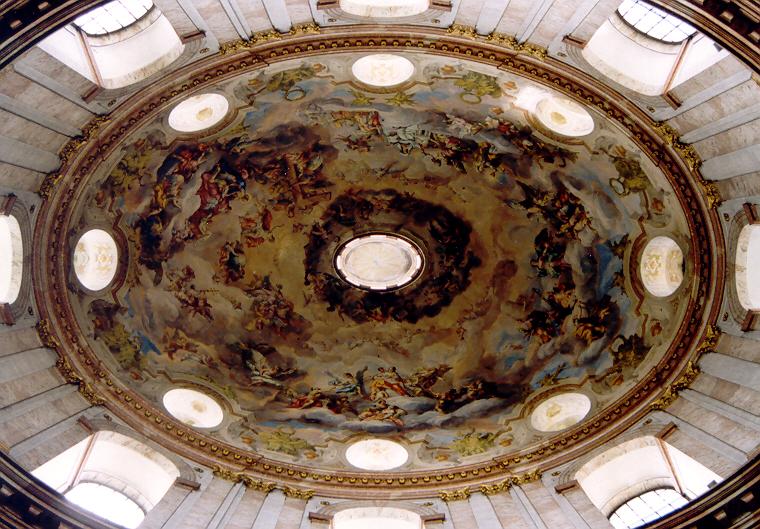|
Theophil Antonicek
Theophil Antonicek (22 November 1937 – 19 April 2014) was an Austrian musicologist. Career Born in Vienna, Antonicek studied musicology at the University of Vienna with Erich Schenk. He received his doctorate in 1962 and his habilitation in 1978. Until his retirement he was a lecturer at the University of Vienna. Antonicek was a corresponding member of the philosophical-historical class of the Austrian Academy of Sciences since 1984 and a full member since 1995, as well as editor of the Denkmäler der Tonkunst in Österreich since 1998. From 1998 to 2010 he also supervised the publication series "Studien zur Musikwissenschaft". As co-founder of the Austrian Society for Musicology, he directed it from 1973 to 1983. On the occasion of his 70th birthday he was honoured by a symposium. Antonicek died in Vienna at the age of 76 and was buried at the Romantic Cemetery in Maria Enzersdorf. Publications * '' Ignaz von Mosel (1772–1844). Biographie und Beziehungen zu den Zeitg ... [...More Info...] [...Related Items...] OR: [Wikipedia] [Google] [Baidu] |
Musicologist
Musicology (from Greek μουσική ''mousikē'' 'music' and -λογια ''-logia'', 'domain of study') is the scholarly analysis and research-based study of music. Musicology departments traditionally belong to the humanities, although some music research is scientific in focus (psychological, sociological, acoustical, neurological, computational). Some geographers and anthropologists have an interest in musicology so the social sciences also have an academic interest. A scholar who participates in musical research is a musicologist. Musicology traditionally is divided in three main branches: historical musicology, systematic musicology and ethnomusicology. Historical musicologists mostly study the history of the western classical music tradition, though the study of music history need not be limited to that. Ethnomusicologists draw from anthropology (particularly field research) to understand how and why people make music. Systematic musicology includes music theory, aesthe ... [...More Info...] [...Related Items...] OR: [Wikipedia] [Google] [Baidu] |
1937 Births
Events January * January 1 – Anastasio Somoza García becomes President of Nicaragua. * January 5 – Water levels begin to rise in the Ohio River in the United States, leading to the Ohio River flood of 1937, which continues into February, leaving 1 million people homeless and 385 people dead. * January 15 – Spanish Civil War: Second Battle of the Corunna Road ends inconclusively. * January 20 – Second inauguration of Franklin D. Roosevelt: Franklin D. Roosevelt is sworn in for a second term as President of the United States. This is the first time that the United States presidential inauguration occurs on this date; the change is due to the ratification in 1933 of the Twentieth Amendment to the United States Constitution. * January 23 – Moscow Trials: Trial of the Anti-Soviet Trotskyist Center – In the Soviet Union 17 leading Communists go on trial, accused of participating in a plot led by Leon Trotsky to overthrow Joseph Stalin's regime, and assas ... [...More Info...] [...Related Items...] OR: [Wikipedia] [Google] [Baidu] |
Members Of The Austrian Academy Of Sciences
Member may refer to: * Military jury, referred to as "Members" in military jargon * Element (mathematics), an object that belongs to a mathematical set * In object-oriented programming, a member of a class ** Field (computer science), entries in a database ** Member variable, a variable that is associated with a specific object * Limb (anatomy), an appendage of the human or animal body ** Euphemism for penis * Structural component of a truss, connected by nodes * User (computing), a person making use of a computing service, especially on the Internet * Member (geology), a component of a geological formation * Member of parliament * The Members, a British punk rock band * Meronymy, a semantic relationship in linguistics * Church membership, belonging to a local Christian congregation, a Christian denomination and the universal Church * Member, a participant in a club or learned society A learned society (; also learned academy, scholarly society, or academic association) is an ... [...More Info...] [...Related Items...] OR: [Wikipedia] [Google] [Baidu] |
Academic Staff Of The University Of Vienna
An academy ( Attic Greek: Ἀκαδήμεια; Koine Greek Ἀκαδημία) is an institution of secondary or tertiary higher learning (and generally also research or honorary membership). The name traces back to Plato's school of philosophy, founded approximately 385 BC at Akademia, a sanctuary of Athena, the goddess of wisdom and skill, north of Athens, Greece. Etymology The word comes from the ''Academy'' in ancient Greece, which derives from the Athenian hero, '' Akademos''. Outside the city walls of Athens, the gymnasium was made famous by Plato as a center of learning. The sacred space, dedicated to the goddess of wisdom, Athena, had formerly been an olive grove, hence the expression "the groves of Academe". In these gardens, the philosopher Plato conversed with followers. Plato developed his sessions into a method of teaching philosophy and in 387 BC, established what is known today as the Old Academy. By extension, ''academia'' has come to mean the accumulatio ... [...More Info...] [...Related Items...] OR: [Wikipedia] [Google] [Baidu] |
University Of Vienna Alumni
A university () is an institution of higher (or tertiary) education and research which awards academic degrees in several academic disciplines. Universities typically offer both undergraduate and postgraduate programs. In the United States, the designation is reserved for colleges that have a graduate school. The word ''university'' is derived from the Latin ''universitas magistrorum et scholarium'', which roughly means "community of teachers and scholars". The first universities were created in Europe by Catholic Church monks. The University of Bologna (''Università di Bologna''), founded in 1088, is the first university in the sense of: *Being a high degree-awarding institute. *Having independence from the ecclesiastic schools, although conducted by both clergy and non-clergy. *Using the word ''universitas'' (which was coined at its foundation). *Issuing secular and non-secular degrees: grammar, rhetoric, logic, theology, canon law, notarial law.Hunt Janin: "The university i ... [...More Info...] [...Related Items...] OR: [Wikipedia] [Google] [Baidu] |
21st-century Musicologists
The 1st century was the century spanning AD 1 (Roman numerals, I) through AD 100 (Roman numerals, C) according to the Julian calendar. It is often written as the or to distinguish it from the 1st century BC (or BCE) which preceded it. The 1st century is considered part of the Classical era, epoch, or History by period, historical period. The 1st century also saw the Christianity in the 1st century, appearance of Christianity. During this period, Europe, North Africa and the Near East fell under increasing domination by the Roman Empire, which continued expanding, most notably conquering Britain under the emperor Claudius (AD 43). The reforms introduced by Augustus during his long reign stabilized the empire after the turmoil of the previous century's civil wars. Later in the century the Julio-Claudian dynasty, which had been founded by Augustus, came to an end with the suicide of Nero in AD 68. There followed the famous Year of Four Emperors, a brief period of civil war and inst ... [...More Info...] [...Related Items...] OR: [Wikipedia] [Google] [Baidu] |
Masaryk University
Masaryk University (MU) ( cs, Masarykova univerzita; la, Universitas Masarykiana Brunensis) is the second largest university in the Czech Republic, a member of the Compostela Group and the Utrecht Network. Founded in 1919 in Brno as the second Czech university (after Charles University established in 1348 and Palacký University existent in 1573–1860), it now consists of ten faculties and 35,115 students. It is named after Tomáš Garrigue Masaryk, the first president of an independent Czechoslovakia as well as the leader of the movement for a second Czech university. In 1960 the university was renamed ''Jan Evangelista Purkyně University'' after Jan Evangelista Purkyně, a Czech biologist. In 1990, following the Velvet Revolution it regained its original name. Since 1922, over 171,000 students have graduated from the university. History Masaryk University was founded on 28 January 1919 with four faculties: Law, Medicine, Science, and Arts. Tomáš Garrigue Masaryk, pro ... [...More Info...] [...Related Items...] OR: [Wikipedia] [Google] [Baidu] |
Akademische Druck- Und Verlagsanstalt
:''There also were unrelated publishing houses in Stuttgart and in (East-)Berlin, and there is the (JAVG).'' The Akademische Druck- und Verlagsanstalt (ADEVA) is an Austrian book publisher in Graz that specialises primarily in publishing lavish facsimile editions. History The publishing house was founded by Paul Struzl (1914–1973) in Graz. Trained as a typesetter and with a doctorate in economics, Struzl began work in 1947 by acquiring a Rotaprint machine from the province of Styria and founding an offset printing company under the name of his father-in-law Franz Hacker. In 1949, Struzl founded the Akademische Druck- und Verlagsanstalt and brought in the printing works he had established in 1947.Karlpeter Elis''Steirische Druckgeschichte'' 1982; retrieved 2 July 2021 Numerous library holdings had been destroyed in World War II, therefore the focus of activity was first on reprinting scholarly works, often in collaboration with the Wissenschaftliche Buchgesellschaft. In the ... [...More Info...] [...Related Items...] OR: [Wikipedia] [Google] [Baidu] |
Karlskirche
The ''Rektoratskirche St. Karl Borromäus'', commonly called the ''Karlskirche'' (), is a Baroque church located on the south side of Karlsplatz in Vienna, Austria. Widely considered the most outstanding baroque church in Vienna, as well as one of the city's greatest buildings, the church is dedicated to Saint Charles Borromeo, one of the great counter-reformers of the sixteenth century.Brook 2012, pp. 146–147. Located just outside of Innere Stadt in Wieden, approximately 200 meters outside the Ringstraße, the church contains a dome in the form of an elongated ellipsoid. History In 1713, one year after the last great plague epidemic, Charles VI, Holy Roman Emperor, pledged to build a church for his namesake patron saint, Charles Borromeo, who was revered as a healer for plague sufferers. An architectural competition was announced, in which Johann Bernhard Fischer von Erlach prevailed over, among others, Ferdinando Galli-Bibiena and Johann Lukas von Hildebrandt. Cons ... [...More Info...] [...Related Items...] OR: [Wikipedia] [Google] [Baidu] |
WorldCat
WorldCat is a union catalog that itemizes the collections of tens of thousands of institutions (mostly libraries), in many countries, that are current or past members of the OCLC global cooperative. It is operated by OCLC, Inc. Many of the OCLC member libraries collectively maintain WorldCat's database, the world's largest bibliographic database. The database includes other information sources in addition to member library collections. OCLC makes WorldCat itself available free to libraries, but the catalog is the foundation for other subscription OCLC services (such as resource sharing and collection management). WorldCat is used by librarians for cataloging and research and by the general public. , WorldCat contained over 540 million bibliographic records in 483 languages, representing over 3 billion physical and digital library assets, and the WorldCat persons dataset (Data mining, mined from WorldCat) included over 100 million people. History OCLC OCLC, Inc., doing bus ... [...More Info...] [...Related Items...] OR: [Wikipedia] [Google] [Baidu] |





